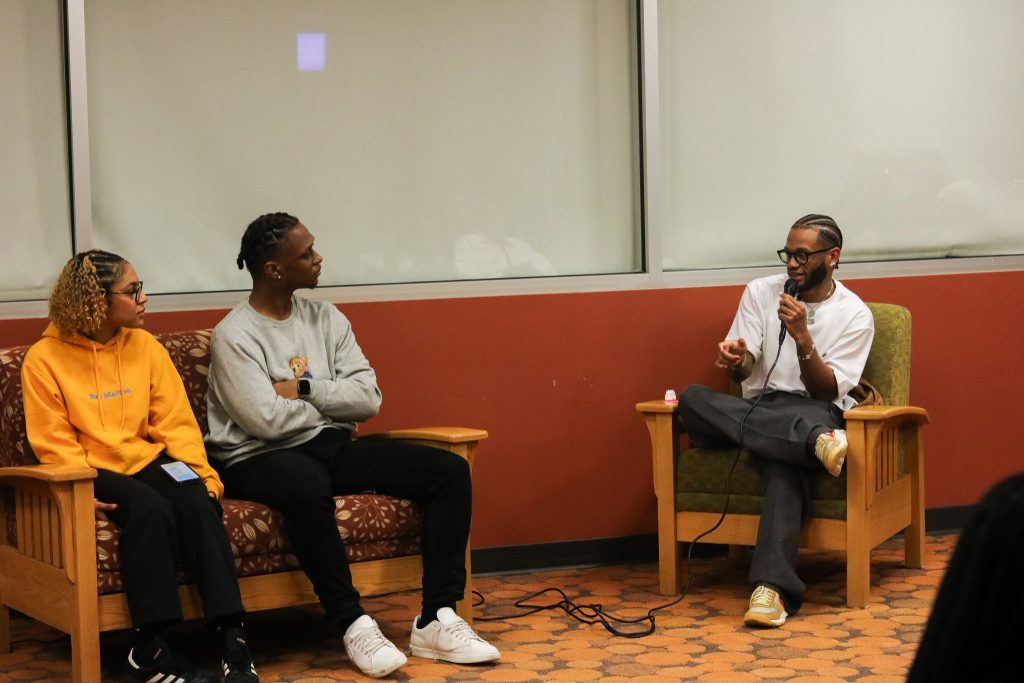As part of their Black History Month programming, the Black Student Union (BSU) hosted a keynote speaker event featuring Demetrius Harmon, a Gen Z internet personality, actor and business owner.
The event was a safe space for attendees to ask Harmon questions and feel seen. A Detroit native who began his social media career as a freshman in high school, Harmon gained a following on YouTube and Vine. He owns “You Matter,” a clothing brand that encourages self-esteem and provides physical comfort for those struggling — with embroidery reading “I feel weak, but I know I’m strong” on hoodies’ wrists. Students were encouraged to write positive affirmations on Post-it notes, which included phrases like “just be raw,” and “I am not defined by my past — I am driven by my future.”
Jahi Ferguson, BSU’s vice president and a senior majoring in biology, described why the organization chose Harmon as the event’s keynote speaker.
“[BSU] took into consideration the need for our community to feel heard as a result of Black and POC students still trying to navigate their mental health in post [COVID-19] academia,” Ferguson wrote in an email. “Knowing that [Harmon] is someone who we all grew up watching and his efforts to produce intentional and transparent conversations regarding mental health, entrepreneurship and creativity, we knew he would be the perfect fit for our event.”
Following Harmon’s arrival, Kylian Isaacs, BSU’s political correspondent majoring in philosophy, politics and law, and Paris Defreitas, the publications coordinator and social cultural coordinator and a sophomore majoring in philosophy, politics and law, asked questions about his advocacy for mental health — especially for young people — and discussed his motivation to inspire them “to be honest, transparent and bold with their dreams and desires.” Harmon shared his goal of creating safe spaces for teenagers by holding events like a field day and a roller skating outing.
“I would say [that] I got into my most trouble in high school from start to finish,” Harmon said. “[I was] doing things I knew I shouldn’t be doing … there were no places to go […] I have a really soft spot in my heart for I would say probably like 14 to 23 [year-olds] … I feel like that’s when you’re trying to find yourself and that’s when you need a space to do that safely without poor influences.”
Throughout the discussion, Harmon emphasized the importance of community, saying that “anybody can be there for you, if you allow them to be.” This belief has been central in his efforts to provide young people with resources, physical space and a community for them to be authentic. He hopes to offer accessible recorded courses, ranging from entrepreneurial work to the arts and helping people achieve their dreams.
“With BSU’s Black History Month theme “For Us, By Us,” we wanted to highlight the importance of spaces that are tailored to the needs, desires and wants of Black students [and] made by Black students,” Ferguson wrote. “Thus, the goal of our event was to personify the concept of carefully curated, intentionality and empowerment, through not only the selected speaker, but the questions asked, the room setup and even the music that was played.”
The second half of the keynote was a Q&A session, which created a space for audience members to engage with Harmon about topics like placing one’s worth, how religion and tragic events shaped his outlook and other topics surrounding mental health issues among young people of color.
“We hope our lasting impact to be one of our community remaining united and empowered, that we as young Black people can become entrepreneurs, can heal from trauma and discuss mental health openly and to appreciate what goes into community building and sustaining that,” Defreitas said. “We as Black people must curate these spaces with [the] intention for our community, and by members of it.”
BSU’s Black History Month programs have included general body meetings about reparations, inventions and innovations made by Black folks and the groundwork laid by predecessors entitled “My Ancestor’s Wildest Dreams.” BSU has collaborated with many University multicultural organizations, including the BU chapter of the NAACP, the Haitian Student Association, the Latin American Student Union, the National Society of Black Engineers, the National Pan-Hellenic Council, the African Student Organization and the Caribbean Student Association.
Black History Month was created by Carter Woodson, a historian, and Jesse Moorland, a minister, and is an annual celebration of Black accomplishments and achievements. In an Instagram post announcing their programming, BSU wrote, “we also use this month to highlight the stories of Black individuals across the diaspora as a way to acknowledge our linked heritage.”
“BSU hopes the audience left Keynote 2024 with a sense of community that they may not have felt in Binghamton before,” Ferguson wrote. “Our mission is to promote Unity in Heritage and building community [in] every aspect of the word, hence our different yearly programming. From our Youth Program, where we bring Black and Brown children aged 5-13 to campus, to our UTURN program where we mentor young incarcerated individuals, to Vanguard, which is our on-school creative arts publication to the entire Black History Month. Our goal for Keynote and every BSU-held event is to show the importance of being present and listening to the person next to you in order to move forward in a positive direction together. BSU was so thrilled to see how impactful this event was, and we can not wait for the [University] community to see what we have in store for them for the rest of the semester.”
Editor’s Note (2/26/24): This article has been updated with the moderators’ names, and a correction about the skating event.



